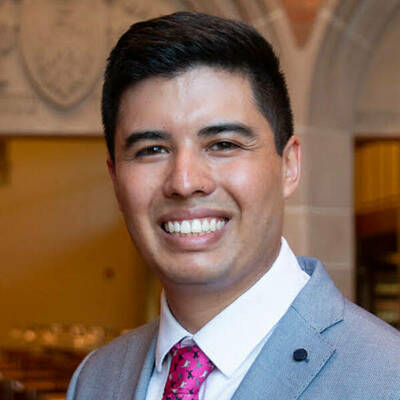Nicolás E. Buitrago Rey

Nicolás Buitrago Rey is Colombian human rights lawyer pursuing his LL.M. in international human rights law at Notre Dame Law School.
“Human rights, in general, are facing challenges because of their use in political discourse as something undesirable, or as a Western imposition. Therefore, it is necessary to encourage communities and societies to be empowered and know the human rights they are entitled to just because of being human beings."
You have been interested in human rights since your undergraduate days. What inspired this interest?
I was concerned as a human being and future lawyer when I was in my undergraduate studies, seeing that serious human rights violations were occurring on a daily basis in Colombia and other places around the world. I have seen how academia and law schools have played an essential role in protecting human rights in several aspects. For instance, Universidad del Rosario, my undergraduate university, supports strategic litigation, conducts research on human rights, trains human rights lawyers and defenders, and provides rehabilitation and guidance for victims. That’s why I decided to become an international human rights scholar, able to explore the dynamics and challenges of human rights.
Are there any individuals - professors, clients, or colleagues - who have been especially influential in your development?
The human rights professors I have had in Colombia and the United States have inspired me to see human rights as a tool for a better world. Human rights have enabled the voices of the oppressed to be heard and allowed a change in how we understand the law and peacebuilding processes. Moreover, coming from a country where a peace process is being implemented has shown me that human rights are necessary for building a peaceful society for everyone, especially for groups that have been historically excluded. Therefore, I consider that Colombian society has had an important role in my development as a human rights lawyer and scholar. The diverse Colombian population, its human rights defenders, and the victims of the armed conflict, have shown me the resilience that humankind has in building a peaceful community where human rights must be at the center of the table, regardless of the painful past we have endured.
What areas of human rights interest you the most?
My main interest is LGBTIQ+ human rights. These rights have been historically overlooked and recently gained a position in the human rights institutions and jurisprudence. Persons with diverse sexual orientations and gender identities have been discriminated against for decades, facing social stigma and discrimination just for expressing love or gender in ways different from those traditionally accepted by society. LGBTIQ+ human rights allow society to be more open to diversity and acknowledge the common human dignity we all have, regardless of the many differences we may have.
What obstacles do you perceive as the most challenging in your work?
Human rights, in general, are facing challenges because of their use in political discourse as something undesirable, or as a Western imposition. Therefore, it is necessary to encourage communities and societies to be empowered and know the human rights they are entitled to just because of being human beings. Moreover, I consider that the lack of funding for human rights lawyers, projects, and institutions is one of the main challenges human rights professionals faces. For this reason, the role of institutions such as the Klau Center for Civil and Human Rights in supporting professionals interested in human rights protection is crucial for the future of human rights.
How has your experience at Notre Dame been so far? How do you think this experience will benefit you in your future work?
I have studied international law and human rights in three law schools so far. Many of them have taught me how to approach human rights defense and research. Notwithstanding, my professors at the Notre Dame Law School have been the ones that made me re-think the foundations of human rights and the reason why we should be part of the human rights agenda. The focus of Notre Dame Law School in the respect and protection of human life, dignity, and the common good has shown me that the most critical component in human rights law is precisely the human beings. For instance, professors Diane Desierto and Paolo Carozza are the most inspiring professors a human rights lawyer can find at a law school engaged in human rights protection. Therefore, Notre Dame has inspired me to be a different kind of lawyer; not only a good human rights lawyer, but a lawyer who does good.